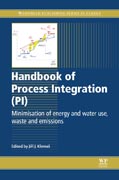
Handbook of Process Integration (PI): Minimisation of Energy and Water Use, Waste and Emissions
Klemes, J
Since its first development in the 1970s, Process Integration (PI) has become an important methodology in achieving more energy efficient processes. This pioneering handbook brings together the leading scientists and researchers currently contributing to PI development, pooling their expertise and specialist knowledge to provide readers with a comprehensive and up-to-date guide to the latest PI research and applications.After an introduction to the principles of PI, the book reviews a wide range of process design and integration topics ranging from heat and utility systems to water, recycling, waste and hydrogen systems. The book considers Heat Integration, Mass Integration and Extended PI as well as a series of applications and case studies. Chapters address not just operating and capital costs but also equipment design and operability issues, through to buildings and supply chains.With its distinguished editor and international team of expert contributors, Handbook of Process Integration (PI) is a standard reference work for managers and researchers in all energy-intensive industries, as well as academics with an interest in them, including those designing and managing oil refineries, petrochemical and power plants, as well as paper/pulp, steel, waste, food and drink processors. This pioneering handbook provides a comprehensive and up-to-date guide to the latest process integration research and applicationsReviews a wide range of process design and integration topics ranging from heat and utility systems to water, recycling, waste and hydrogen systemsChapters also address equipment design and operability issues, through to buildings and supply chains INDICE: Part 1 Overview of Process Integration and analysis: Process Integration (PI): An introduction; Basic Process Integration terminology; Process design, integration and optimisation: Advantages, challenges and drivers. Part 2 Heat integration: Heat integration: Targets and heat exchanger network design; Application of Process Integration to the synthesis of heat and power utility systems including combined heat and power (CHP) and industrial heat pumps; Total site methodology; Extending total site methodology to address varying energy supply and demand; Analysis and design of heat recovery systems for grassroots and retrofit situations; Heat integration in batch processes. Part 3 Mass integration: Water pinch analysis for water management and minimisation: An introduction: Using systematic design methods to minimise; Water use in process industries; Synthesis of water networks with water loss and gain via an extended pinch analysis technique; Conserving material resources through Process Integration: Material conservation networks. Part 4 Extended Process Integration: Process Integration for cleaner process design; Process Integration concepts for combined energy and water integration; Process Integration techniques for cogeneration and trigeneration systems; Pinch Analysis for sustainable energy planning using diverse quality measures; A unified targeting algorithm for diverse Process Integration problems; A Process Integration approach for supply chain development; Application of heat recovery loops to semi-continuous processes for Process Integration. Part 5 Applications and case studies: Applications of energy and water Process Integration methodologies in oil refineries and petrochemical complexes; Process Integration of an oil refinery hydrogen network; Retrofit mass integration of acid gas removal systems in petrochemical plants; Applications of pinch technology to total sites: A heavy chemical industrial complex and a steel plant; Applications of Process Integration methodologies in the pulp and paper industry; Application of Process Integration methodologies to the thermal processing of waste; Application of Process Integration methodologies in the brewing industry; Applications of Process Integration methodologies in dairy and cheese production; Applications of Process Integration methodologies in beet sugar plants; Application of Process Integration techniques for the efficient use of energy in a urea fertilizer plant: A case study; Application of Process Integration methodologies for energy saving in buildings and building complexes; Heat transfer enhancement in heat exchanger networks; Applications of pinch analysis in the design of isolated energy systems. Part 6 Software tools and epilogue: Software tools for heat integration; Mass and water integration software tools; Epilogue: The importance of problem formulation and data extraction in Process Integration.
- ISBN: 978-0-85709-593-0
- Editorial: Woodhead Publishing
- Encuadernacion: Cartoné
- Páginas: 1184
- Fecha Publicación: 31/07/2013
- Nº Volúmenes: 1
- Idioma: Inglés
